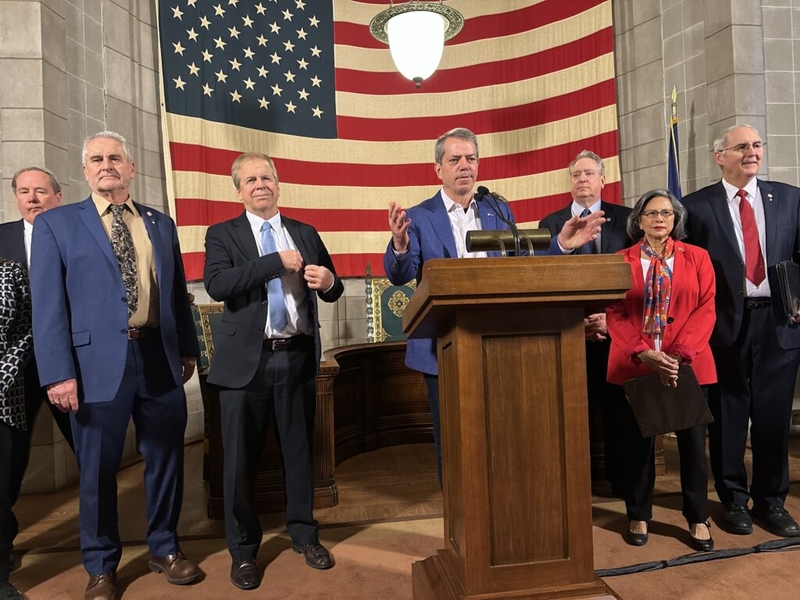Think tank says Pillen education, tax initiatives would ‘quickly drain’ state coffers if enacted

LINCOLN — Nebraska’s $1.9 billion state revenue surplus would “quickly” disappear under proposals by new Gov. Jim Pillen to increase state aid to K-12 education and cut taxes, a Lincoln think tank said Friday.
The OpenSky Policy Institute worked with the Institute on Taxation and Economic Policy, a nonpartisan think tank, analyze Pillen’s proposals to provide additional state aid to K-12 schools, increase spending for special education and make several tax cuts, including enacting a flat, 3.99% state personal and corporate income tax.
The preliminary conclusion from ITEP and Open Sky was that the initiatives might force the state to tap into its cash reserves, a “rainy day” fund intended for one-time expenditures during recessions and other tough times, not funding long-term commitments.
Rosy projections
OpenSky, in a press release, also said that future projections of strong tax receipts are just that — projections that might, or might not, come to pass.
“To ensure our state’s future fiscal health, it will be important for policymakers this session to prudently use the projected $1.9 billion on proven initiatives that empower hardworking Nebraskans to support their families and their communities,” the release stated from the Lincoln-based think tank.
State Sen. Lou Ann Linehan, who chairs the Legislature’s Revenue Committee, questioned how the initiatives could be analyzed before the governor’s budget has been introduced, which will happen Wednesday.
“We have over $2 billion in extra funding, which clearly means that we are taxing people too much,” Linehan said, including funds from the state’s cash reserves. “To say that we shouldn’t cut taxes shows a total disregard for the taxpayers.”

Whether or not Pillen’s initiatives are sustainable, financially, will likely be a key point of debate over his proposals.
‘Very sustainable’
During a press conference unveiling his ideas, the Republican governor, a Columbus veterinarian and hog producer, said the tax cuts were “very sustainable” and “very, very conservative.”
Pillen said they would fit into the budget by rejecting ideas to increase spending, citing requests by hospitals and health care providers in the state to help address workforce shortages and increased expenses.
Some of his proposals address long-time goals of some organizations: The state’s business community has long sought lower income tax rates, farmers have asked for a fairer way to value agricultural land, and educational interests have complained for years about a shortage of funds to educate students with special needs.
But OpenSky has maintained that the state’s glut of funds was, in large part, caused by the influx of billions of dollars of federal funds to deal with the COVID-19 pandemic, which makes the “flush coffers” temporary.
Jim Vokal, of the Platte Institute, an Omaha-based, free-market think tank, said his organization is still analyzing Pillen’s proposals.
‘Moving in right direction’
But, Vokal said, it’s important that a conversation is underway to “move Nebraska in the right direction” in terms of lower taxes.
He added that if other, and new, sources of tax income are needed to afford the Pillen initiatives, the state should consider rescinding some of the sales tax exemptions it now provides.
The Platte Institute has argued for expanding the state’s sales tax base by removing exemptions for some things, including services.








